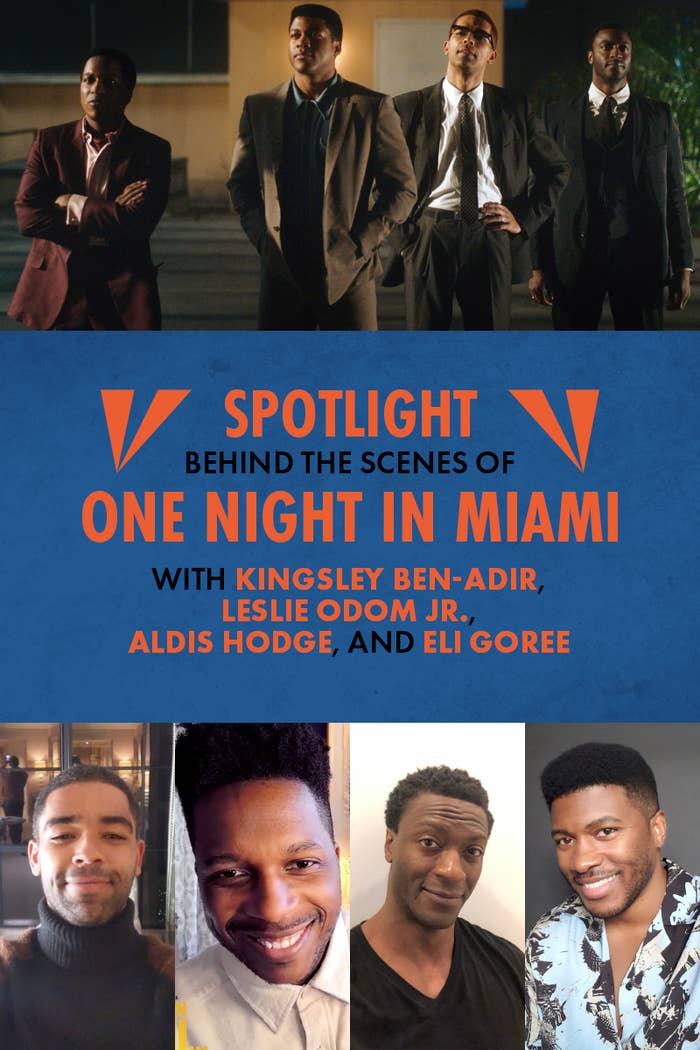
Imagine being a fly on the wall for one of the most legendary nights in American history. Well, Regina King just made that vision a reality with her feature directorial debut One Night in Miami, a fictional retelling of the real night human rights activist Malcolm X, championship boxer Muhammad Ali (formerly known as Cassius Clay), soulful singer Sam Cooke, and NFL star Jim Brown got together in Miami on Feb. 25, 1964, to celebrate Muhammad Ali's championship win over Sonny Liston.
The film, which was adapted from Kemp Powers's original 2013 play, delves into the men behind the high-profile names and explores the genuine bond that they created with each other and that many never knew existed. A conversation about race and responsibility turns their celebratory night into a moment of self-discovery, as they passionately discuss what it means to be Black and advocate for change in America while also fighting to stay alive.
To learn more about the pieces that brought this cinematic puzzle together, we sat down with Kingsley Ben-Adir (Malcolm X), Aldis Hodge (Jim Brown), Eli Goree (Muhammad Ali), and Leslie Odom Jr. (Sam Cooke) to discuss how they prepared for the film, the scenes they're most proud of, what a film like this means today, and so much more!
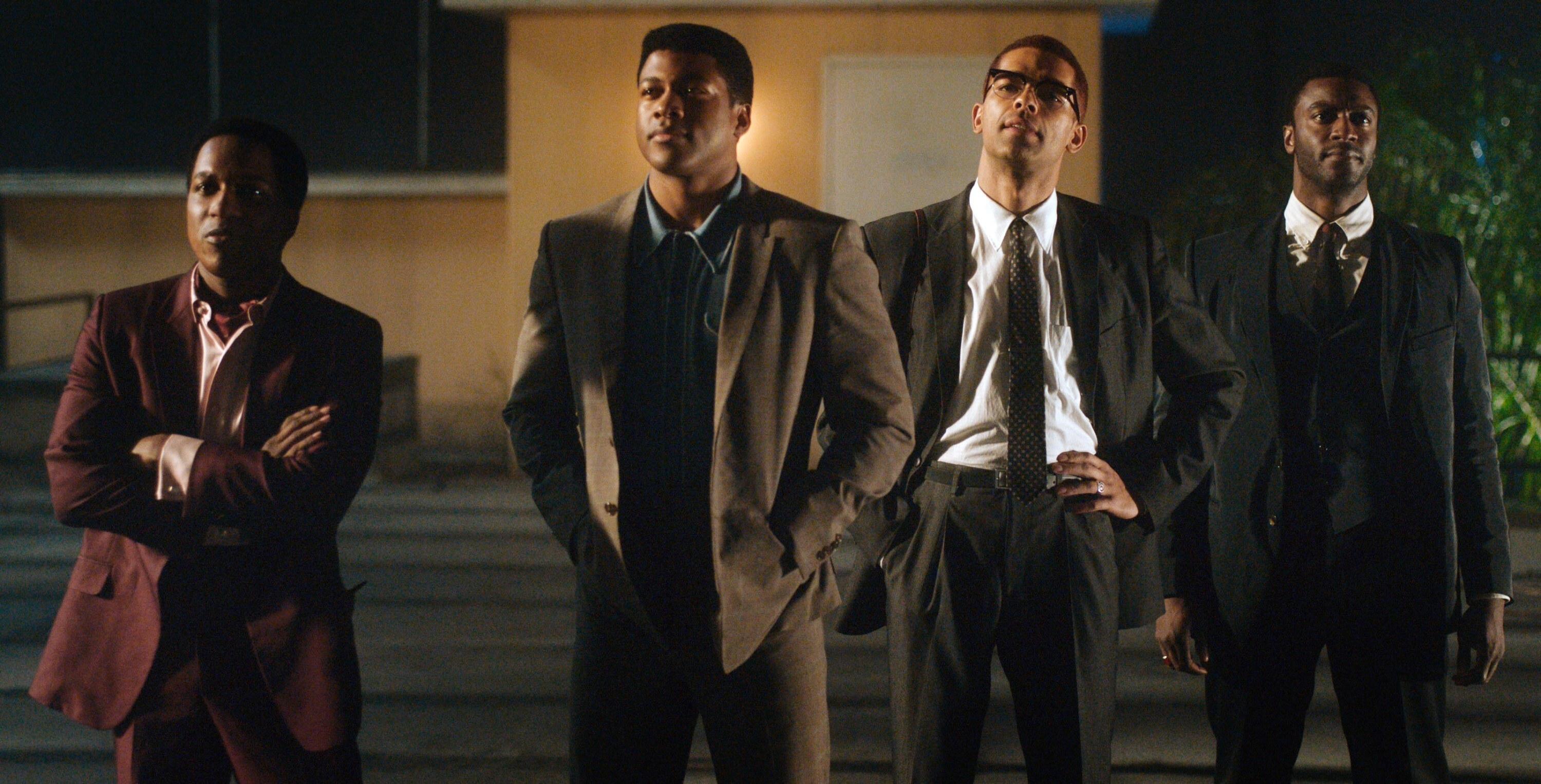
Congratulations on the film, gentlemen! From the lines to the mannerisms, you each delivered powerful performances that I'll never forget. Can you tell me how you heard about the project and what the audition process was like?
Aldis Hodge: The project just came through my agents and my manager said, "Hey look, we found an audition. We're tracking a project that we think is really good and interesting, and Regina's directing it." So, when it came to the audition process, I was actually in Sydney, Australia working on The Invisible Man, so the time frame was different. And then the time allowance for getting my audition, I was a little short because they were casting fast. Sometimes I would go between my lunch breaks or in between a scene setup, or something like that, and go record myself on tape for the audition. With the time difference, when I would send it in and get notes, I was up at like four or five o'clock in the morning on the phone. I got on the phone with Regina for notes. Regina and I, we clicked and had a great conversation that lasted a little minute, like two hours, just talking about culture and the importance of the project. Then the second audition came and I just, I guess I got lucky.
Kingsley Ben-Adir: I originally read for Cassius, not because anyone had any interest in seeing me for Cassius but because my agents liked the idea of me playing him. I'm nearly full-on gray [referring to his hair], so I just didn't feel that it was my place. So then I connected with Malcolm and asked my team to let me know if anything had happened yet with the actor who was signed up to play Malcolm, because I'd love to audition. I was kind of joking, but four and a half months later the part became available, and Regina had a few weeks to find someone. So I put a few scenes down and then Regina and I jumped on the phone. I remember we had a two-week sort of back-and-forth, filled with lots of conversations. I did a chemistry test with Leslie, and then Aldis and I spoke on the phone for three or four hours. And then I got the job just before just before Christmas.
Eli Goree: It's funny because — and much respect to whoever was attached before — but as soon as we read with you, I was like, "Man, no one else could do this." Like, you were the guy. So it was really cool. For me, I had another opportunity to play Ali in the Ang Lee film Thrilla in Manila that I was really hoping to get; and after I didn't get it, I was kind of crushed. It was like something I really, really wanted, so I just decided there's gonna be other stories told about Muhammad Ali. He actually told me I favored him for a long time, so I just said I'm just going to keep working on playing him. I'm going to build all the tools to be able to play him better than anyone else. I got a dialect coach, I got a personal trainer, I got boxing coaches, and I would just tell all my writers on different shows I was working on that I box: "If you can write that into the show — I want to work on my boxing." But nothing really came up to play him.
About a year later, I decided I was going to do a play called Fetch Clay, Make Man about Stepin Fetchit and Muhammad Ali's relationship and the friendship that they had and that most people didn't know about. Right before I was really getting into the process of putting the play together, a friend of mine saw on Instagram that Regina King was casting for Cassius Clay. I think I saw Regina, actually, on the very first audition. One of the things that she liked about me was that I stayed in character. In between scenes, I just stayed as Cassius because I'd already been working on it for so long, like I could read the phone book as Cassius at that point. So, I tested with Aldis after that, and you know, it was a beautiful, beautiful blessing.
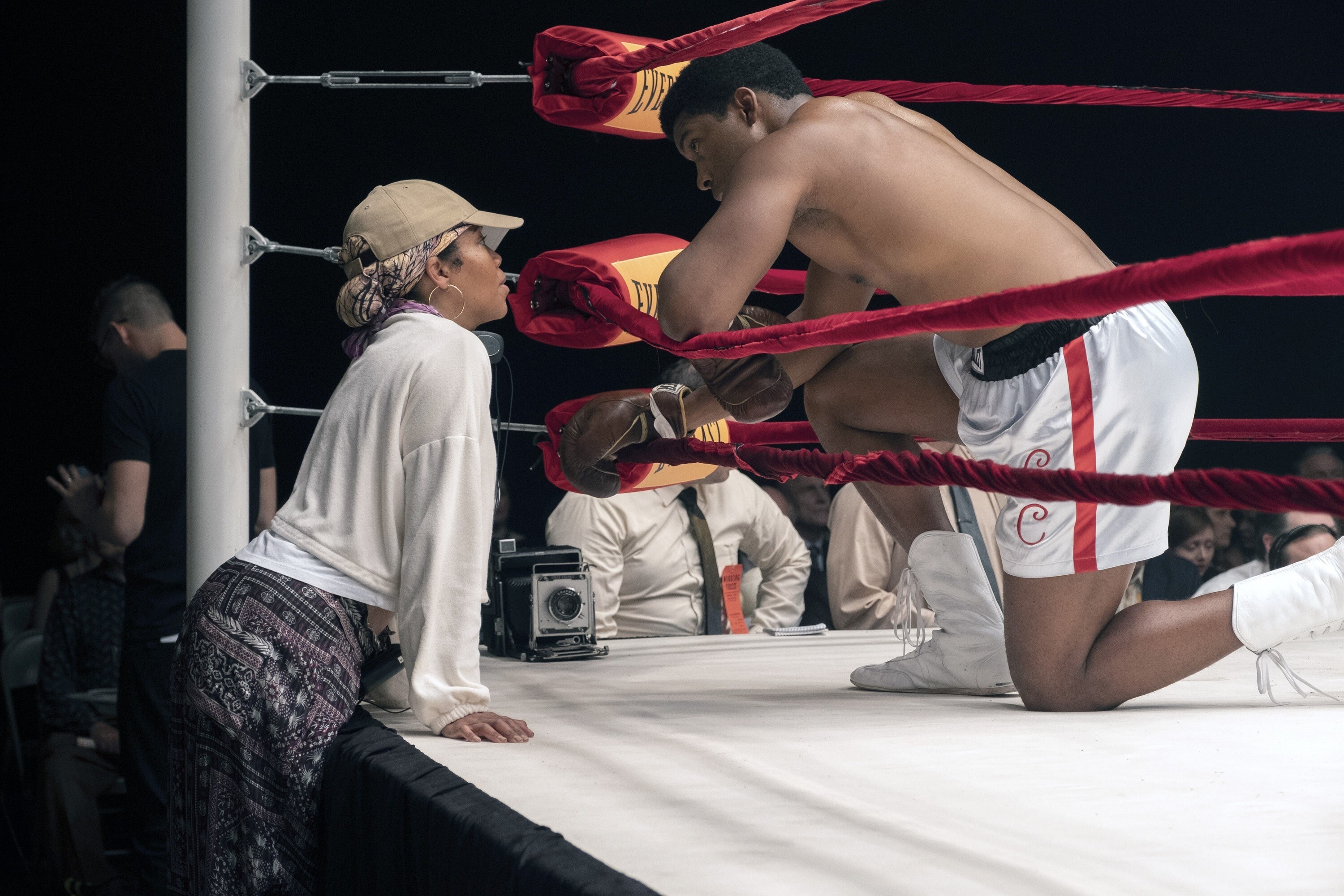
Leslie Odom Jr.: I kept getting phone calls from friends of mine who were going in for Sam Cooke, and they were like, "Have you been in for Sam yet?" And I was like, "Nah, I'm good. I don't need to do that." My agent sent me the audition material and I said, "Respectful pass. Thank you so much." I only say that because I thought the shoes would be ill-fitting, you know? I just I thought that there must be someone somewhere that was better suited than me. Also, when you're a young actor or a young anything, really, people are real quick to slap a label on your forehead. They want to do it as soon as possible, saying things like, "You're kind of like a young Don Cheadle–ish, Denzel-ish, Sam Jackson," because they don't want to think too much about you. They're busy. But none of those labels are really who you are. They don't really set you up for any kind of success. You're not gonna be those guys. So, because of Hamilton, I finally thought I separated myself a little bit from that. And for the first time people were like, "Oh, yeah, you're Leslie Uggams Juniors — yeah, Leslie Odom Jr. Right, you were in Hamlet? No, Hamilton...right, right, right."
I had enough things going on that I was separating myself a little bit from all that had come before and it just didn't seem all that wise for me to go try to impersonate somebody else. I was finally in a place to show the world who I am. But my agent and my manager called me and they said, "We think you're making a mistake." They never called me like that about something before. They said, "We think you need to take a look at One Night in Miami again. And I was like, well, if you guys are calling me like this, let me heed your advice. And so I did. I looked at the script again and I saw what these guys saw: I saw that Kemp was doing something daring. He was pushing the boundaries in a film and usually in film the way we push boundaries is through violence and sex, or the craft of filmmaking too. But this was a script that felt a little spicy and all they were doing was talking. So what's spicy about that is that Kemp wanted to show a private conversation publicly. He wanted to show the interior of these men — a deeper interior of the tenets of Black life. He wanted to put that on display and I wanted to be a part of something daring, so I'm glad that I went in.
Eli Goree: Can I just say one quick thing? I'm realizing all three of us might not have been on this film. Like, Malcolm was already cast, Leslie passed, and if I had gotten the role that Kingsley did get, I would have never played Cassius again. It's pretty amazing to me. It just feels like it was really meant to be. Just listening to the three stories just now, if any one of us weren't in it, it wouldn't be the same movie.
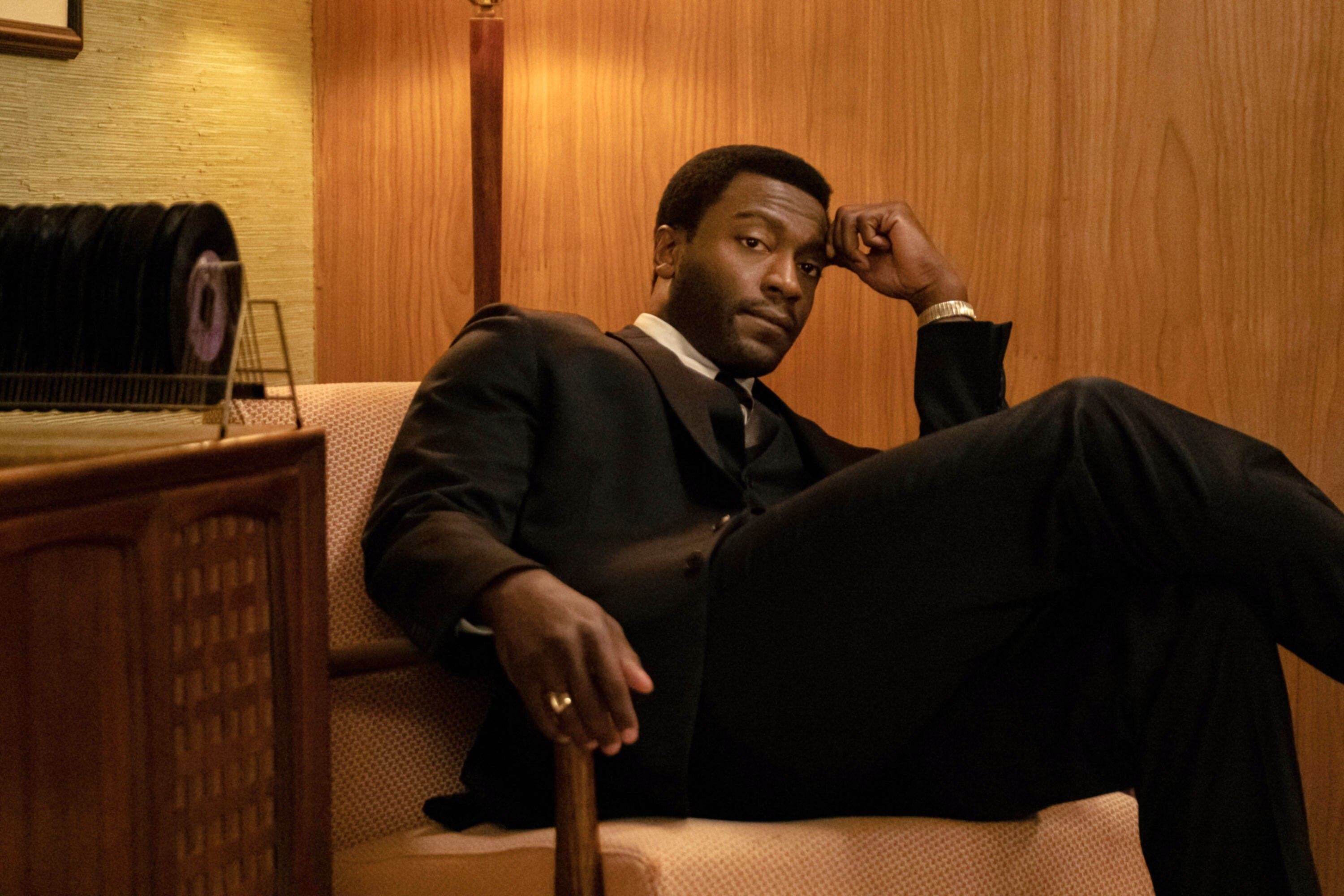
Aldis, Jim Brown is the only remaining legend, from this group, still living. How did you prepare for this role? Were you able to talk to him or did you receive any feedback from any of his relatives?
AH: I wasn't able to speak to Mr. Brown, but his daughter Kim is actually in the film. So if you're looking closely, you'll actually see her make an appearance. I won't tell you where; you're gonna have to go to work to find her. I remember she mentioned to me recently, I think like last week, she mentioned to me that Jim actually saw the film. She said he enjoyed the performance and that he approved. I said, "Whew. All right, I'm good." [Laughs gratefully].
Primarily, just looking up videos of him in the '60s, like his speeches and interviews. One of my favorite, favorite interviews is him debating Lester Maddox on The Dick Cavett Show. Please look it up, because it is awesome! It told me everything I needed to know about how to play Jim Brown. I wasn't concerned with much of the NFL history, not because it didn't apply but because I didn't want to get distracted with where his mind was. He wasn't in One Night in Miami talking about the NFL. He was in this film talking about the importance of their purpose when it came to these men, like economics, that kind of thing. So, I wanted to look up that history, and then also his relationship with the other three men and figuring out what that was. It was pretty cool stuff.
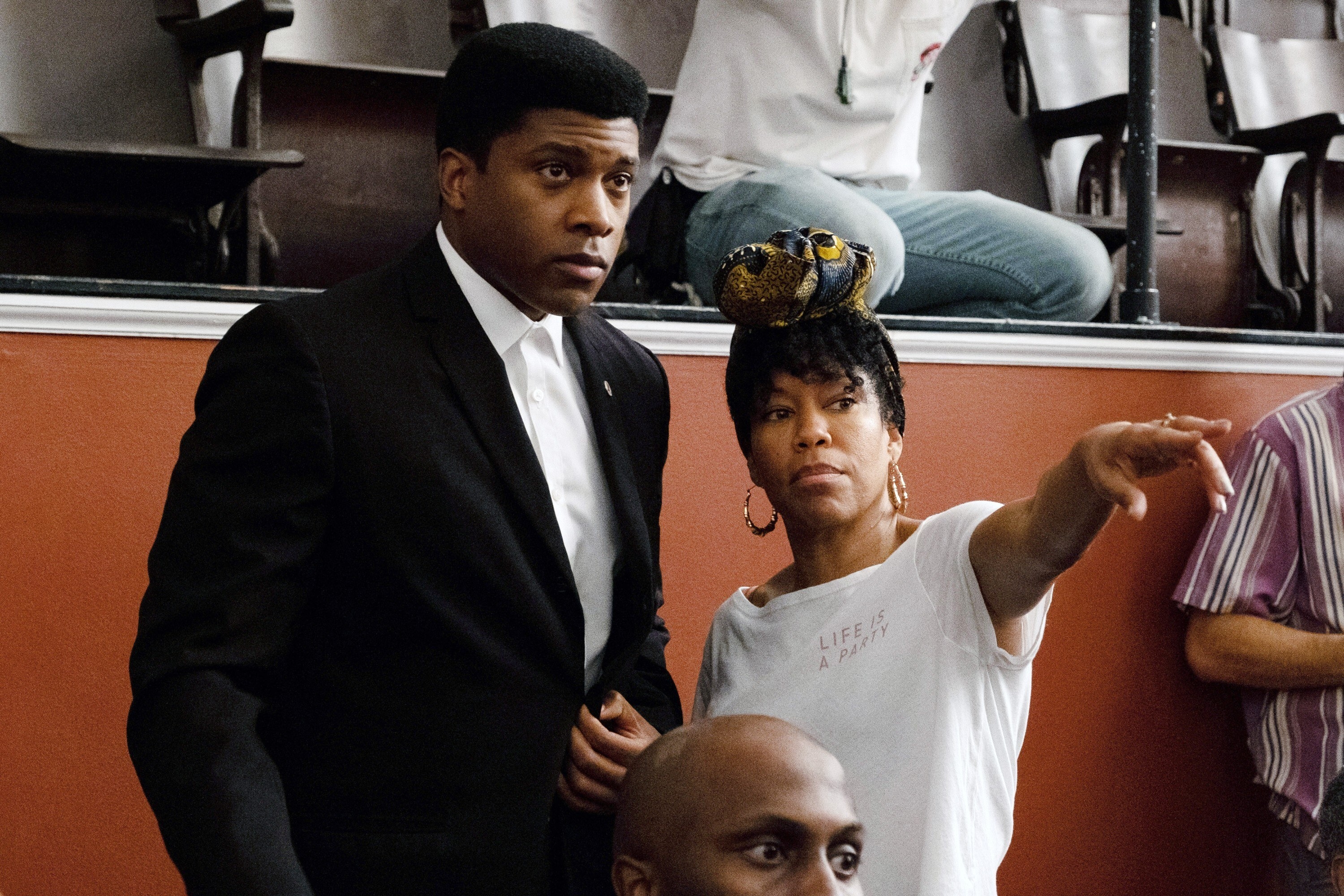
What was it like working alongside Regina King as a director? Did you take away anything from that experience that you still value today?
AH: She's fantastic! As a director, she's a great communicator, and she's very clear about translating her vision and keeping us on point. She's very specific about all the details that she needs. She's very specific about the clothes that we wear and how it's worn and the tones and all that because they spoke to our personalities. Regina's a very visual director and she's brilliant with being able to translate that onscreen and give it a real cinematic pop.
The thing I keep going on about learning from her is patience and humility. I found her to be very patient. Because we were under a huge time crunch, we had a lot of work to do in a very small amount of time to do it; but she just kept it cool. She allowed us to find ourselves. She was really quite patient with us actors and just humble, as all. It never felt like we were being dictated and the environment was never stale. It was always easy to talk to her — easy to approach her about what we needed. Honestly, I think that was one of her superpowers.
EG: It was a master class! It was an education. I took so many things away: her focus, her level of commitment to the work, and the grace with which she carries that. I think some people are really passionate, but you feel that overbearing presence of "If you don't do it the way they're doing it, then you're not doing it right," and then that pressure of "If you can't operate on my level, then I don't want you anywhere around me." But you never felt that with Regina. It was always like, she's a master; she's gotten to the highest pinnacle of what it is that you're trying to do, and she's there to help. She's there to get in the mud with you and show you how she would do it and how she would figure it out, and then she lets you try to figure out how you naturally do it and together we find what works best for the story. She's just a really humble leader and there was never any question about her leadership because she is who she is. She never really had to ever push that on anybody. We just knew and we were grateful that she was there.
LOJ: She brought the same sensitivity and attention to detail to her work, behind the camera, that we've grown accustomed to seeing of her in front of the camera. Watchmen is one of the greatest performances ever seen on a television series, ever, and I've told her this. It was just astonishing to me. Whenever she would take that short walk from behind the camera to me to whisper something in my ear, she always sent me down a more truthful path and entertaining path, which is important. She gave me little bits, little jokes, and stuff that just wouldn't have occurred to me. I love working and I love a diverse work environment, because you get the benefit of all these different perspectives. So it was wonderful to have a female director — a woman at the helm — because whenever Regina offered me something, it was just something that would not have occurred to me. I think some of that has to do with her lived experience as a woman. She's just seen it. There are other things too, but I just thought she was the best, the bee's knees. I loved it.
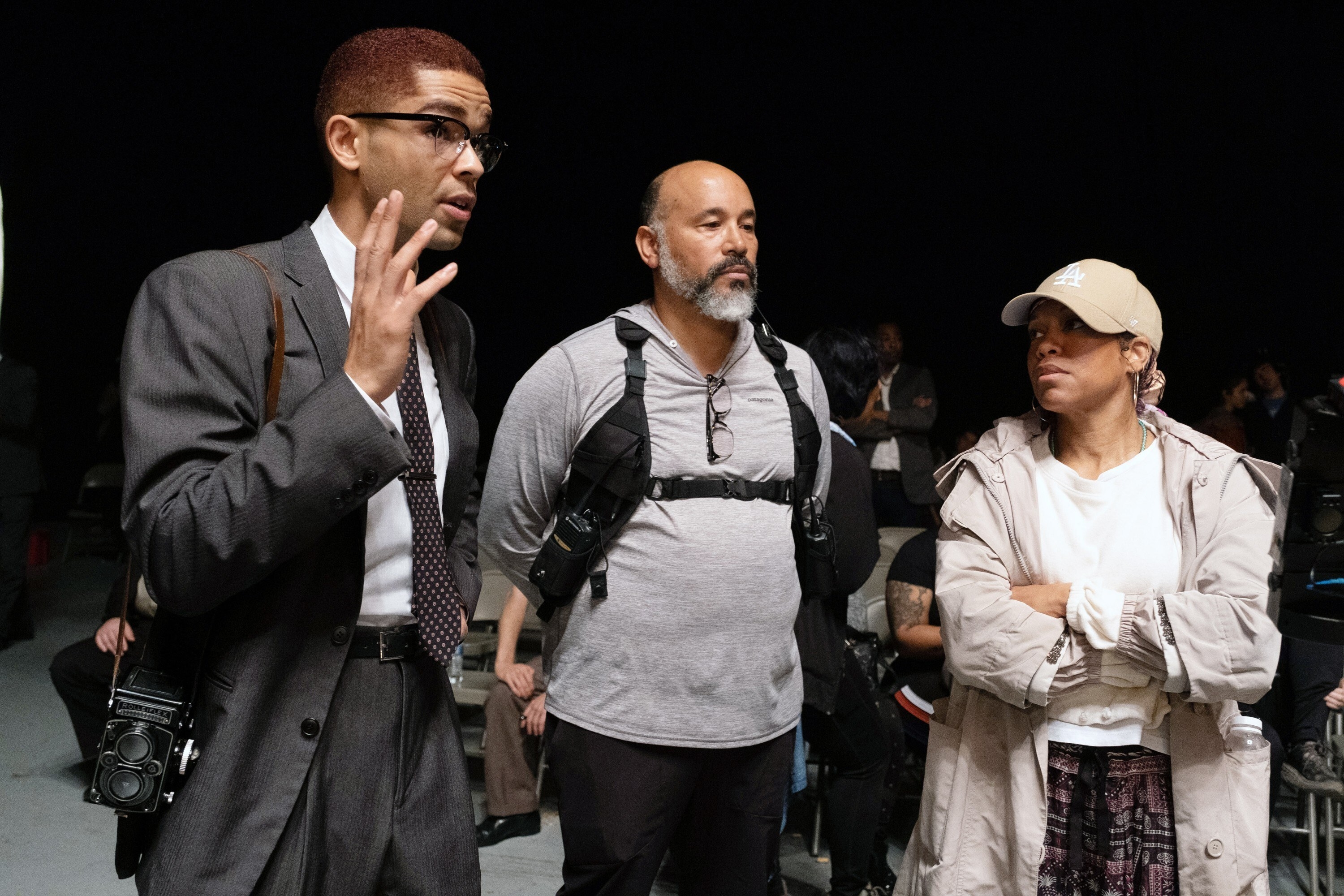
Was there a scene in particular, where she gave you specific direction or feedback that really helped to improve your performance?
AH: There was a scene where I'm in the bathroom — this is right after Sam and Malcolm are in the middle of a heated discussion — and we were just talking about the meaning of him leaving, the meaning of him spending that time, what he was going through, and what he's thinking about in the bathroom. It changed everything. That changed all of the emotional tones for me in that scene, because it gave it purpose — a newfound purpose with what he's contemplating in there, why he's thinking about it, and what he does afterward with the conversation.
KBA: Every moment that was guided and shaped by her input. Sometimes we'd be playing 9 or 10 pages at a time, so we'd cut and then Regina would come in and decorate, and change and shift different moments, and ask for different things. Before we started filming, I remember telling Regina, "I just want to let you know I feel like what I've learned over the last seven or eight years is that I can waste a lot of time trying to ease into scenes. I want to try something different on this job. I'm going to come in hot and heavy on everything. So, don't be scared if some of the first takes are too much. I'd rather do that and then we can work backward, and we agreed on that. I think that conversation set me free, because then I didn't feel worried. That was sort of like an insight into how we sort of set off our collaboration in that way. So Regina would come in and she'd just go, "A little less, just do a little less." Or sometimes even, "Maybe a little more." There was an honesty about that way of working that I found really helpful.
That's amazing! It's really interesting to hear all of the things that help bring a scene to life. One of my favorite scenes in the film comes right after Sam and Malcolm’s blowout argument, where Malcolm and Jim continue their conversation about the plight of Black people in America. Jim says, “I’m not anyone’s weapon, Malcolm,” to which Malcolm replies, “You need to be, so that we can win.” How does that quote relate to you in the present day?
AH: I think today, I can understand them both at the same time. Nobody can sit down right now. Given the last four years and the most recent events, how much more proof do we need to understand that we all need to be in this fight? I'm not just talking about Black people: We all have to be inspired to learn from everybody else. Y'all gotta be up in it with us, because it's something that affects everybody. It's almost like we have to be weapons in the fight right now in order to afford the luxury of not having to be later. But I know, for the Black community, we've never been able to, at least in my experience in this country, have that luxury of not having to think about fighting for ourselves in certain ways.
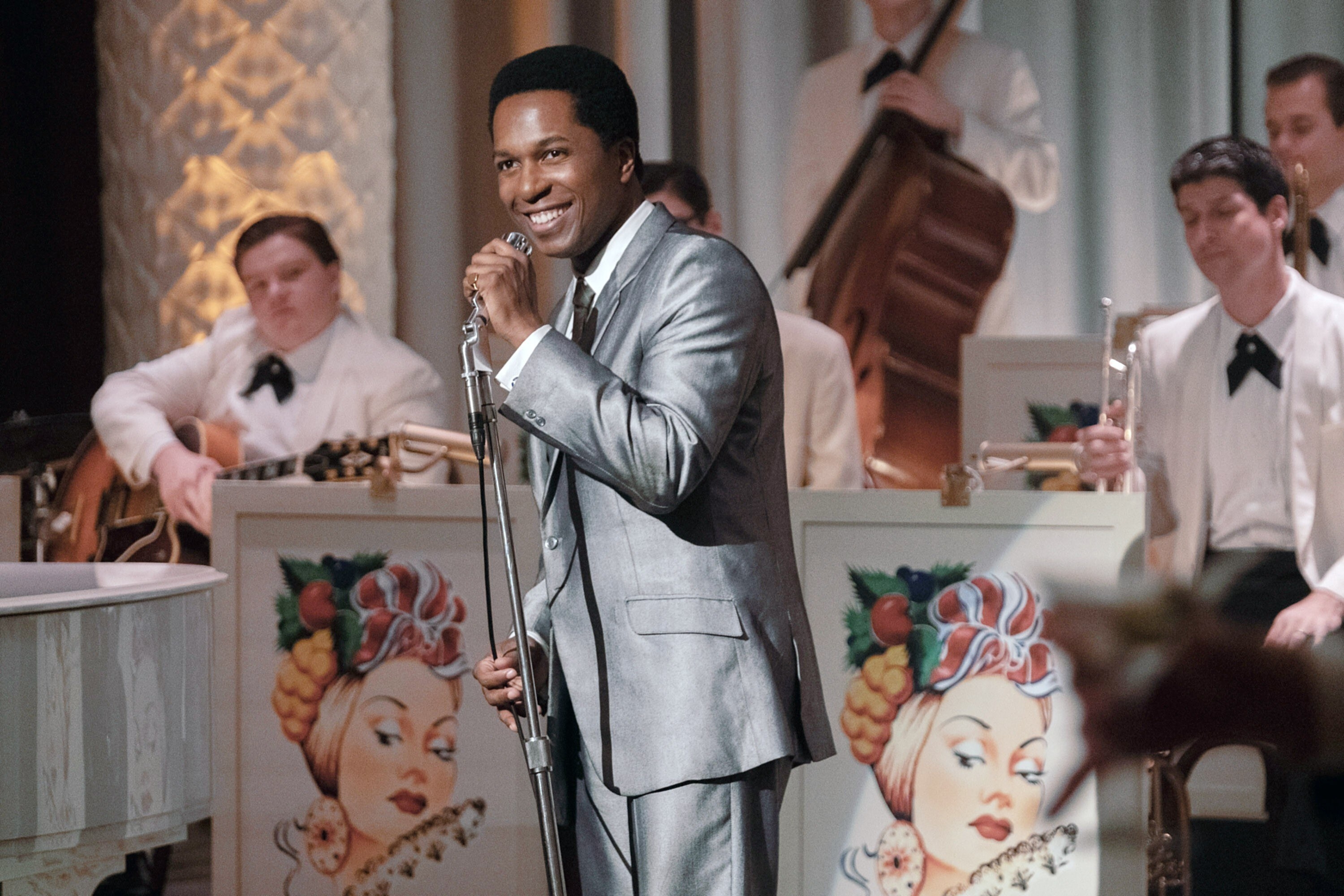
Is there one scene in particular that you're most proud of?
AH: I'm proud of them all, but I think the one that does strike me the most is the scene between Malcolm and Jim at that table. It says so much in such a short time and I think it sums up Jim and his quiet demeanor. Jim is very observant and responsive through the majority of the film but not as talkative through a lot of it. I think that him and what he says at that table are a combination of all those observations up to that point.
LOJ: We spent the first four or five days — correct me if I'm wrong, Kingsley — shooting the bulk of Kingsley's hotel stuff, which is the heart and soul of the film. We shot Kingsley's scenes first because Kingsley was going to do Obama next in The Comey Rule. So I felt like Kingsley Ben-Adir as Malcolm X laid into me for seven or eight days straight and because of the way it was laid out, we weren't getting to my response yet. So, there's nowhere for that tension to go. We get our real body and our real emotions involved in this acting thing that we do, so I was feeling the heat of him coming at me. I'm sitting in that chair as he calls me all kinds of names, so there was a lot of tension in my body seven, eight days. When I did get my chance to respond, I was like, "Ohhhhh, now. Let's do it! I got a couple of pages, brother." I really loved that. It was like acting school. There's not a whole lot of stuff that you can point to where Black and brown actors are given the chance to use our training in this way, you know? We get trained on Shakespeare and Molière and August Wilson too, but very rarely are we given this kind of dialogue that Kemp Powers has given us where we get to use the things that we've learned. So I loved all the sparring that we get to do in the hotel.
KBA: I just enjoyed all of it, man. The easy answer to that question is the scene around the table with Jimmy, because something happened in that moment. But, actually, you know what, no. I loved getting to the last week when Eli was in the ring and Michael Imperioli was around, which, I mean, I couldn't speak. I had these tiny, little bits at the beginning of the story that I wanted to add in to show Malcolm respondent to how important Cassius's win was for him. It's just as important storytelling-wise to make sure that we had those cutaways of Malcolm. I loved playing with that, because I felt the pressure had kind of gone. They add the prayer when Cassius wins; I said to the journalists, let's add some prayers. So I really loved coloring in the scenes and trying to add to that huge moment at the beginning. You know, just with little kinds of flashes. When I saw the way Regina cut it together, I felt so proud because it was a reminder that it all fucking matters. It's not just about the scenes where you're in the room and you've got 15 pages; it's also about when you're not speaking. So yeah, I love that. There was one bit when I kept going to Regina asking, "Is that too much? Is he too excited for the win?" And she was like, "No, no, no, no, because it sets up how important it was." So yeah, I'd say watching Eli fighting with Michael Imperioli there — it felt like a different time.
EG: Honestly, I have so many. It'd be hard to boil it down. I'll say three. The first one is Kingsley. I think it was the day after George Floyd and it hit me so much more when Kingsley said his line, "Black people can't be on the fence. Our people are dying in the street every day. Black people are dying. Every day." I remember I was in my seat and he walked past me, and I kind of bumped him because I was standing there. I was like, "I'm not letting you move me off my spot. I'm the champ of the world," and he took all that energy and just threw a haymaker back with words. It just came out of him. I remember everyone in the room — you can feel it on the film — the room went dead silent. That's not acting. I was like, "What just happened, because none of the other takes had been like that." It was just a moment where you're like, oh shoot, I just saw a film moment. That's gonna leave a lasting impression forever.
The other moment — I wasn't there — but it was Leslie, with his "A Change Is Gonna Come" scene. When he dropped the tear of tears. It was beautiful. And for me, my most proud moment was just my first day on set. I got to do all my stuff on the bed and give my speech. It was our very first day of all of us doing our thing. Like Leslie said, to have words like that and actions like that, and to be able to interact and look in the mirror. I've been preparing to play Cassius for almost two years; so to finally have that moment, it felt like something that could never be taken away. I did it... Well, you know, I knew in the moment I did it well, and I honored it. I put the work in. So those three moments were special for me in the process.
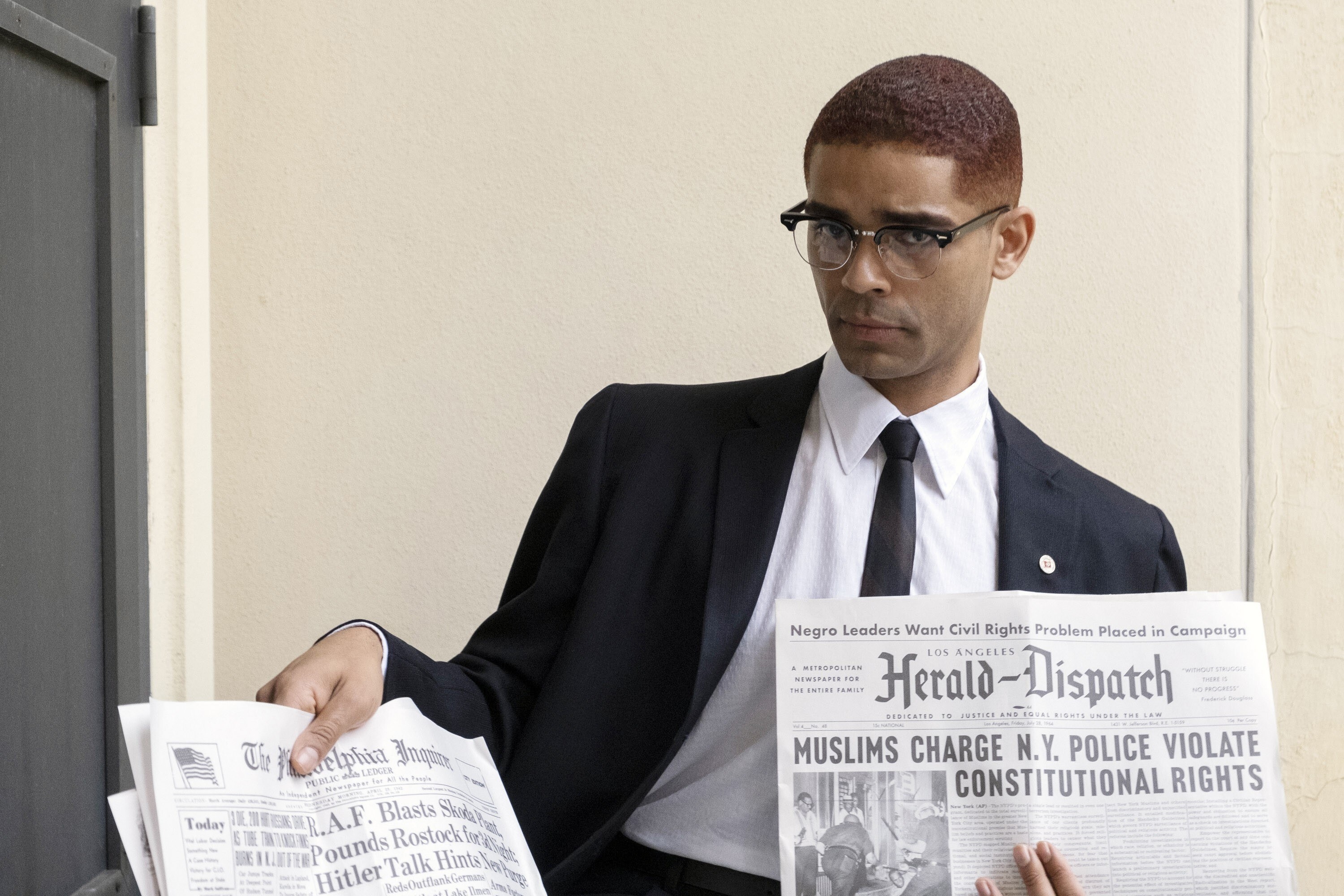
The characters address the double-edged sword that comes with being a public figure interested in activism, especially when it comes to the Black community. Some believe it’s your duty to speak out, while others think it’s none of your business. What are your thoughts on these societal pressures?
AH: I think that when people have that conversation — because I have had that conversation and that judgment — take the celebrity title out of it, because at the end of the day, regardless of my job, I'm still a citizen. Otherwise, you're telling me that my job negates any right that I have to speak my mind. I'm a taxpaying citizen. There are people who are hypocritical about their stance on that as well, you know? Take the situation with LeBron James, when Laura Ingraham told him to "shut up and dribble." Okay, why? Because he understands the necessity to use his platform to stand up for the rights of Black people and Black lives?
Okay, but in that very same breath, you have people talking about Drew Brees and how he said he has a right to his opinion. Yeah, he absolutely has a right to an opinion, just like LeBron has a right to his opinion. You can't be a hypocrite. So again, celebrity should be taken out of the equation. What is your responsibility to yourself as a citizen? If you are affluent in any particular profession and you have different assets and tools to use to bolster your platform for the better good, use it! Because anybody else, if they had it, they would use it too. Just use it for the right thing.
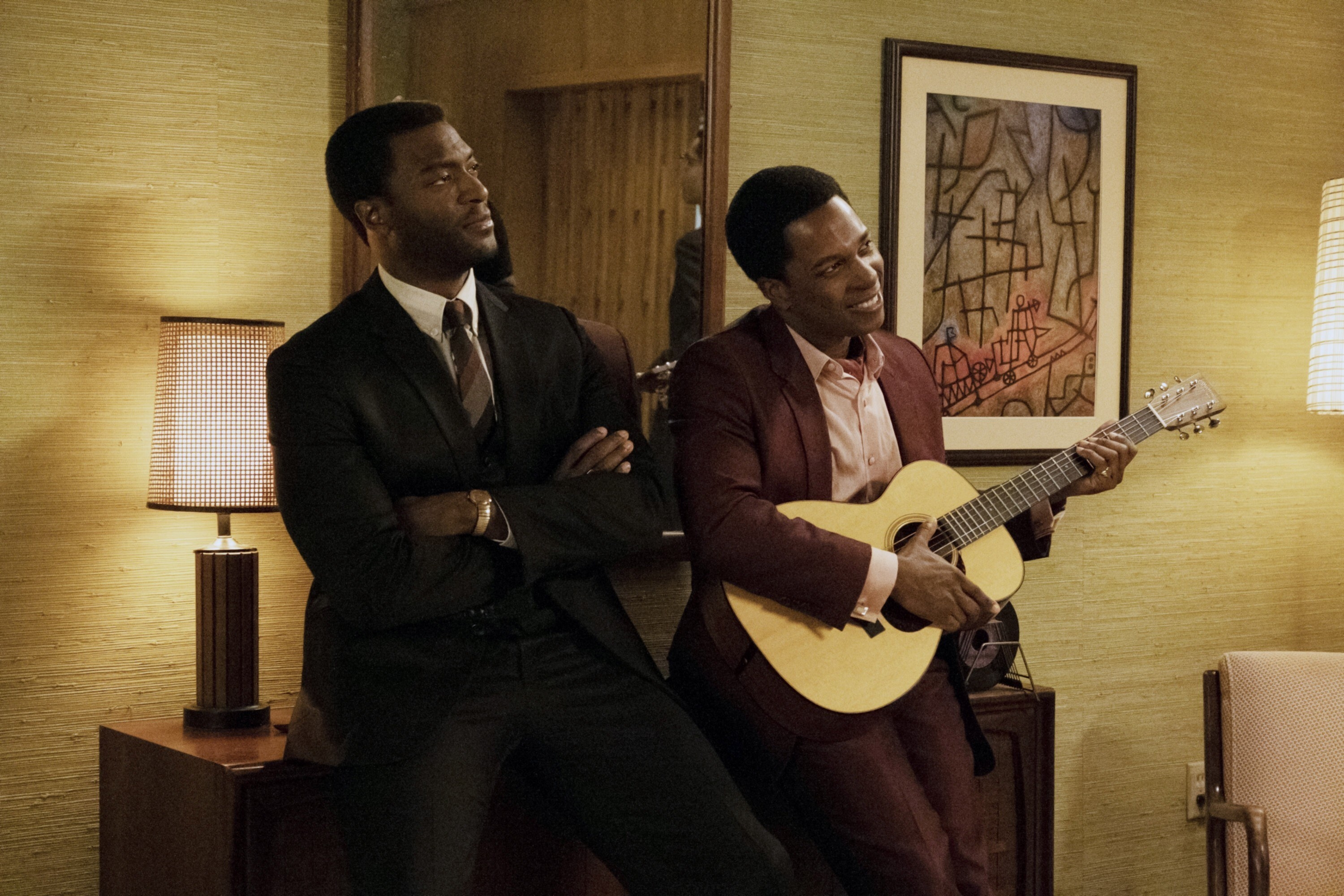
With several themes from this film still relevant to today's social climate, why was it important for you to make this film?
AH: It's important because I'm speaking to my purpose. I personally feel like this is my responsibility to myself and to my family. I speak on this often, because I was raised up with this conversation. It's never dissipated at any moment in my life and this is something that has never gone away, at least to my knowledge, for the Black community. I speak out vehemently. My family and I, we go out there. We were protesting several times. We've been shot at by the police. I'm serious. This is not a game. Yo, when you're out there in those crowds and people start running, then you start seeing smoke and tear gas...it makes no sense. You're just out there walking, you know what I mean?
So, this is something that's in my wheelhouse and something that is a part of my nature. I'm really lucky and grateful to be afforded the opportunity as an artist to use what my environment is and what my profession is to speak to my agenda. I've said this many times, but this is what I call effective art: something that has something to say, something that can push a bit of a personal message forward. To be able to be a part of this, in this particular time, I'm really profoundly lucky.
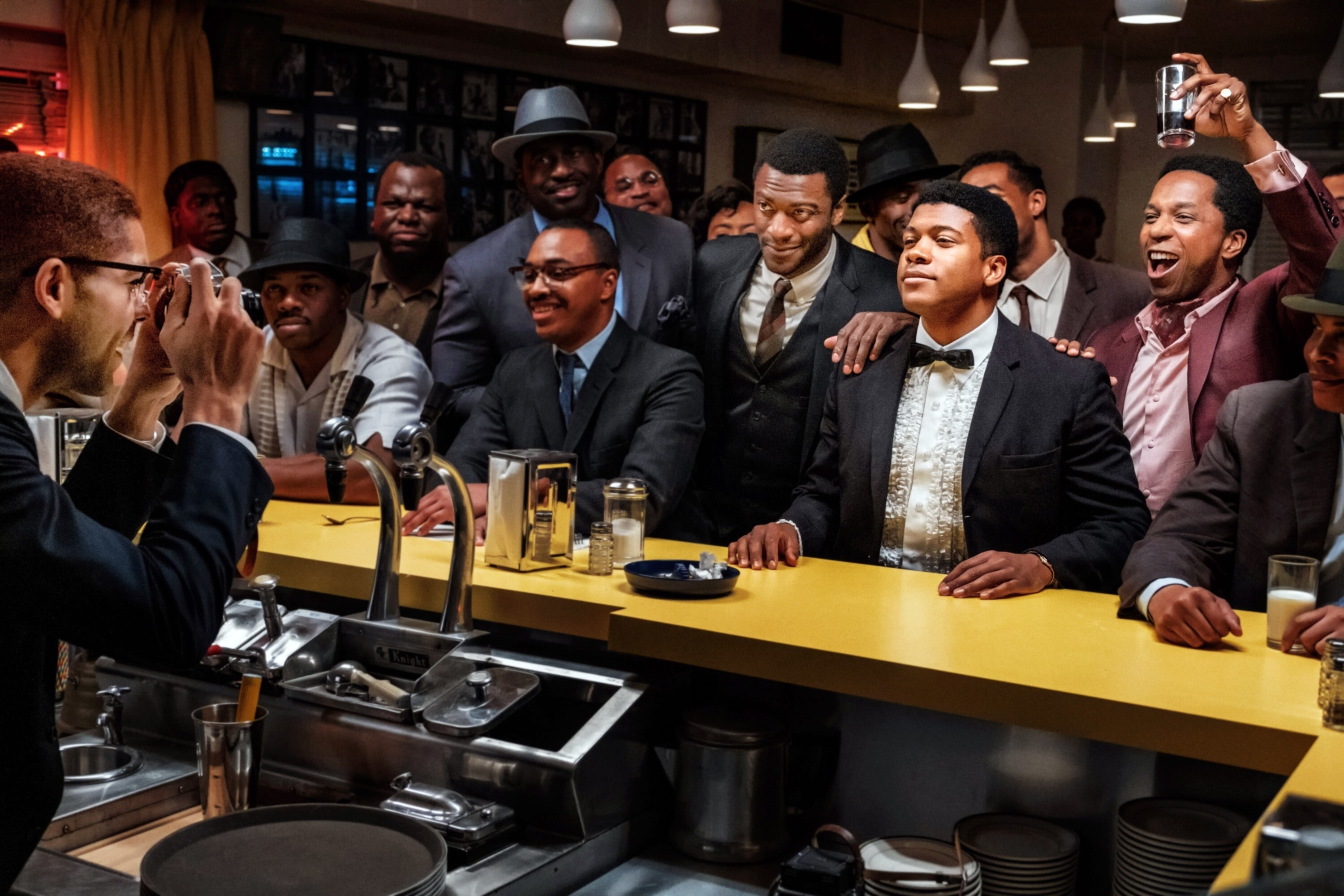
And for my final question, I have to know, were you able to keep anything from set?
AH: As a gift, they gave me the ring that I wore. So that's a little memento sitting at home in a drawer.
KBA: Yes, I got the Rolleiflex camera! They don't know that. I just took it [laughs].
EG: They gave me the shorts, the boxing trunks, and a bunch of stuff. They were the ones used on set with his initials and insignia. So I got to keep those.
LOJ: I didn't I didn't take anything [laughs]. After I've finished working with a prop or costumes on set, I never want to see it again [laughs]. Yeah, so I didn't take anything. I never do.
If you haven't already, or if you're in the mood for a rewatch, be sure to check out Kingsley, Aldis, Leslie, and Eli in One Night in Miami, available to stream on Amazon Prime now.
